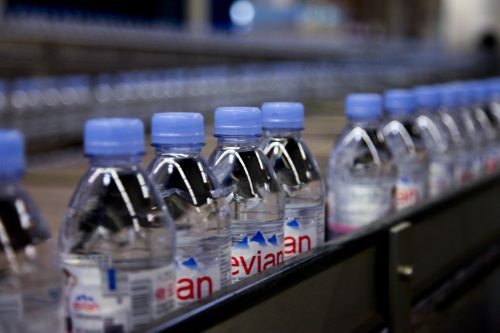Evian plastic bottles will be manufactured from 100 percent recycled plastic by 2025, the mineral water brand announced recently.
Today’s Evian plastic bottles are 100 percent recyclable, but they only contain, on average across all global ranges, 25 percent recycled plastic.
 The goal of making Evian plastic bottles from 100 percent recycled plastic exemplifies Danone’s intention to fully embrace the circular economy. Image: Danone
The goal of making Evian plastic bottles from 100 percent recycled plastic exemplifies Danone’s intention to fully embrace the circular economy. Image: Danone
Evian, which is part of the French multinational food group Danone, gets its name from Évian-les-Bains, a French spa town on the south shore of Lake Geneva that is near to the sources of the natural spring water that it bottles.
PET plastic
A number of companies will be partnering with Evian to meet the goal of 100 percent recycled plastic by 2025.
One of these is Loop Industries, whose large-scale method produces the high quality of recycled PET (rPET) plastic that Evian requires.
Polyethylene terephthalate, or PET for short, is a strong and light form of clear polyester that is used to make plastic bottles and other containers in a range of industries.
PET plastic is fully recyclable. At present, most of the recycled form of PET goes to industries such as textiles that use it in fibre form.
However, the bottle-to-bottle market for recycled PET is growing.
Circular economy
The goal of making Evian plastic bottles from 100 percent recycled PET is in line with Danone’s intention to fully embrace the circular economy promoted by the Ellen MacArthur Foundation.
In early 2017, Danone announced that they had formed a partnership with the Ellen MacArthur Foundation that is “aimed at accelerating the global transition to a circular economy.”
A particular focus of the partnership will be the New Plastics Economy initiative that urges all sectors to “re-think and re-design” the use plastic, starting with packaging.
The aim is to move away from the linear economy model, in which plastic follows a linear path that starts with manufacture from raw material (PET is made from fossil fuels) through consumption and then finishes with disposal.
According to Loop Industries, in this model, “$80 to $100 billion of [plastic] is thrown out after being used only once,” and only a small percentage is recycled.
In a circular economy model, product design takes into account the need for the material to be recycled again and again.
Thus, for Evian plastic bottles to be made from 100 percent recycled plastic, the PET cycle is made sustainable by “decoupling” the sourcing from fossil fuels and emphasizing recovery from waste plastic.
